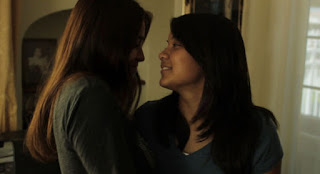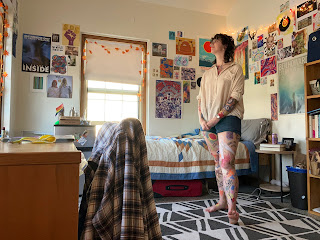Sexual Tension in Mosquita y Mari
So one big question that came up a lot this week was the line between friendship and romance, particularly for queer people and in queer relationships. I definitely saw a lot of queer romantic/sexual tension in this film, and so I decided to take a break from intense film analysis and just for fun instead list out all the little scenes in the movie I noticed that crossed the line from friendly to romantic and even sensual.
The first moment I noticed was after Yoli offered to help Mari with school so she could stick it to the administration who wanted her to drop out. Yoli buys them an ice cream cone to share, and they sit on the stoop of the ice cream shop, passing this cone back and forth and licking it rather sensuously. This was subtle, not overtly sexual or romantic, but the focus on them quietly licking the same ice cream cone definitely stood out to me.
The next moment I noticed is when Yoli goes over to Mari's house, and in her room, Mari shows her the necklace she stole from her mother (we later learn it was Mari's father's). Somewhat out of nowhere, Mari takes her shirt off to look at the necklace in the mirror, and Yoli comes up to stand beside her and look at the necklace, conveniently falling right in the middle of Mari's chest. My memory is the frame of the camera even cuts off their faces, focusing entirely on the two girl's chests next to each other. To me, this implied that Yoli was literally just staring at Mari's chest. Does it get any more gay than that?? Yes! Later on the bleachers during gym, Yoli insults Mari playfully, and they wrestle until Mari has Yoli pinned to the bench between her legs. Classic sexual tension you would find in a straight coming-of-age movie. Unfortunately, they don't start making out.The other two most explicitly romantic/sensual moments are when the girls are studying at Yoli's house. This needs a little bit of preface. Earlier, Yoli tells Mari the story of how her mother and father used to dance together, with her father wearing a cowboy hat. When Mari gives her her walkman, Yoli dances to the music wearing her dad's cowboy hat. I think this shows a desire Yoli has to emulate the romance her parents had together, but it is queered by her wearing her father's cowboy hat, instead of, say, her mother's make-up or high heels or something. This is confirmed while the girls are studying and Yoli puts on some music and starts dancing with Mari, ballroom style with their arms around each other. I guess I will get into a bit of film analysis here to say that there are a lot of instances where Yoli reminisces about the love her parents used to have and resents them for losing sight of it. They also pressure her a lot to study instead of thinking about the boy they think she is with. The distraction she experiences and the lapses in her grades are what would happen in a traditional coming of age movie when a girl started falling for a boy, and the parents say so, but the only person in Yoli's life is Mari, implying she feels that dazed, romantic love for Mari that would heteronormatively come from a boy.
After they dance together, the girls share my favorite moment and take a nap on the couch when mYoli says she's cold and invites Mari to snuggle under a blanket with her just for a little while. In the closeness of their faces throughout that scene, I saw every moment in middle school when I lied next to a girl and wanted to kiss her. They again didn't kiss (grr), but Yoli did rather sensuously run her hand over Mari's stomach. This reminded me of the most vivid date I had with a girl during my personal gay awakening. We were watching a movie together and she fell asleep lying next to me on the couch. After the movie ended, she was still asleep, and I felt like I couldn't move cause I didn't want to wake her, so I just ran my fingers over her back and watched her sleep. It sounded like this moment resonated with a lot of the other students in our class, so I just wanted to share that.
To sort of zoom out from all of this hyper-focused gay detail, I want to point out another favorite moment that made this movie profoundly wonderful to me. There is this constant struggle and back-and-forth between school and love, between the practical demands and pressures placed on children of immigrants and the passions of love. Yoli's father on the drive home from the parent-teacher conference says "Don't lose sight of what's in front of you", and Yoli bitterly responds "Yeah, like you." Her parents tell her not to get distracted from her studies so that she can do better in life for herself than they did. But Yoli sees the way her father has become distracted from his love for her mother and takes this advice to mean she shouldn't lose sight of her relationship with Mari. I found this to be a very profound and beautiful image of young love, but also dark and frustrating that Yoli is placed in a position of having to choose between love and I guess a happy successful not-poor future life. It seems like she shouldn't have to choose and that no one should have to choose, but that her freedom of choice is queered and lost to her status as a brown person in a white supremacist state.
So, I don't know, in conclusion, this movie was a super gay result of disidentification with a heteronormative society that simultaneously presented a somewhat bleak image of a white supremacist capitalist society that forces queer and non-white people to choose between love and monetary success.




Thanks so much for sharing! It was really interesting to hear in class just how people had gone through a similar experience when they were younger of falling in love with their best friend.
ReplyDeleteI really like what you said about how Yoli wanted to emulate the romance between her parents, but that she sort of queers that romance by wearing her Dad's hat, I hadn't noticed that before, and it makes me wonder about other ways she and Mari queer heterosexual romance and family structures throughout the film. You could maybe say that Mari does this by taking on a money making / provider role in her family, which is a role stereotypically ascribed to a father figure... I dunno!
ReplyDeleteThis is a super interesting take, thank you so much for adding to the conversation!
Delete